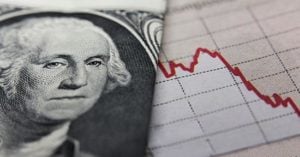The Dow Jones Industrial Average fell over 800 points today (Oct. 10) thanks to China's injection of cash into its economy just as interest rates are rising in the United States.
To help investors navigate the fallout, we wanted to show you exactly what's going on.
We'll take a close look at the two factors dragging down the Dow - plus we'll show you a method you can use to keep your investments intact if markets continue to fall...
Chinese Trade Fallout and Interest Rates are Tanking Markets
With traditionally dependable tech stocks leading today's rout, investors fear that today's drop in the Dow Jones Industrial Average is the start of a drastic market downturn.
Unfortunately, there are two key factors that could make this fear a reality.
On Sunday (Oct. 7), the Chinese government announced a 100-basis-point cut to the nation's reserve requirement ratio - the minimum amount of cash that commercial banks must keep on hand.
The move is expected to inject $750 billion yuan in the nation's economy. That's roughly $109.2 billion American dollars.
Analysts believe that the sudden capital injection by the Chinese government is likely an attempt to purposely devaluate the nation's currency.
Urgent: This catastrophe could bring the U.S. economy to its knees - and make the Great Recession seem like a day at the beach. Read more...
This allows China to make its goods and services cheaper relative to rival American goods and services, harming American industry.
However, it's also a warning sign that China's economy is straining under the weight of America's aggressive trade policies.
As the world's largest developing economy, any slowdown in China's growth threatens to undermine global economic health. And that's rattling markets.
 The Dow is also falling today as investors worry about the impact higher interest rates will have on the bull market.
The Dow is also falling today as investors worry about the impact higher interest rates will have on the bull market.
When interest rates increase, borrowing costs increase too. This pinches the bottom line of companies that need to borrow in order to finance growth.
As a result, higher interest rates can restrict economic growth.
And that's bad for investor returns in much the same way slowing jobs growth is.
Despite today's mounting losses, it's still too early to know if today's losses are the first of significant market downturn.
However, that doesn't mean you shouldn't have a plan to cope with the worst-case scenario...
How to Safely Guide Your Money Through the Worst of This Market Disaster
[mmpazkzone name="in-story" network="9794" site="307044" id="137008" type="4"]
Did you know some of the world's biggest fortunes have been built during some of the most appalling market conditions?
It sounds contradictory...
But all you need are the right tools - and the uncensored truth the mainstream media doesn't want you to know.
See, the incompetent and corrupt people who run some of America's largest financial institutions are only a few weeks away from bringing the U.S. economy crumbling down.
And they don't want you to know the truth until it's too late.
But by arming yourself with the right knowledge today, not only will you and your money be shielded from this market storm - you could also start seeing explosive profits.
And if you make the right moves now, you could make more money in less time than you ever thought possible.
But you don't have much time left to take action.
And once this wave of destruction hits, you'll wish you had seen the signs while there was still time to do something about it.


